THE WISDOM OF THE OLD WAYS - A Visit with the McCune Brothers
The Wisdom of the Old Ways
By Sheila McEntee 2004
Photographs by Steve Shaluta
On a drizzly Sunday afternoon, gray clouds drift above a narrow, winding road hugged by hills in Calhoun County. A fine white mist hangs in the trees that fringe a lone house, framed by a weathered, haypacked barn and a tiny workshop. As we approach the driveway, a trio of beagles in a pen beside the house yaps a nonstop greeting. At the sound, Norville McCune steps onto the front porch to meet the visitors from Charleston who have come to share an afternoon with him and his brother Bruce.
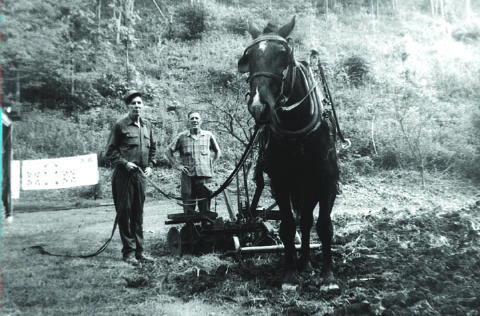
The brothers prefer older farming methods to new technology
When the dogs settle down, Norville, or "Norv," as he is known to his family and friends, settles momentarily atop the porch railing. With long legs dangling from a lanky frame, he seems more like an eager boy of 14 than an elder of 84. His bright eyes punctuate a knowing face that has seen both simple pleasures and hardship.
The McCune brothers have lived on this quiet farm all their lives. Their ancestors were among the first settlers in Calhoun County, and their land-some 100 acres-and house have been in the family for generations. Norv and Bruce were raised, along with four other children, in this modest log house, which has been modified throughout the years. Today, Norv and Bruce, who is 87, and an older brother, Ralph, are the surviving siblings.
A Visit with the McCune Brothers
Ralph, who lives in Ohio, left West Virginia years ago to work in the timber business, but his son Kenneth and daughter-in-law Janet returned to the family land about 10 years ago and built a house just up the road from Norv and Bruce.
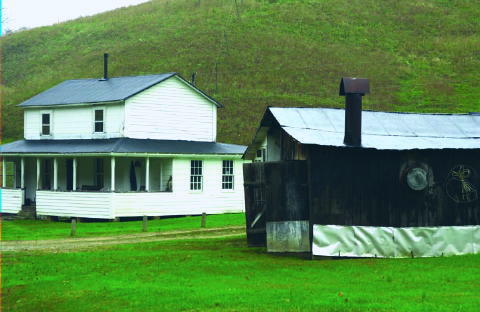
The brothers' farm has been in their family for generations.
Though the events of their lives took them other places over the years-including Europe and the Pacific Theater as enlisted men during World War II-the West Virginia hills always called Bruce and Norv home.
The brothers share a deep respect for the land and their family's part in its history. Theirs is a story of survival-of doing the work that needed to be done and, sometimes, whatever work they could find-and of neighbor helping neighbor.
As much as possible, they still live by the old rules and keep to the old ways. They tend the farm, keep a garden, can what produce they raise, butcher their own beef, hunt only what they will eat,and share their bounty with neighbors and friends.
Both brothers fondly remember bygone days when their hollow was filled with people and when log houses dotted every hill. Bruce and Norv, their siblings, and other children from the hollow trekked over a hill, on a path their father mowed, to the Bear Run School, toting their midday dinners.
The brothers attended the school through eighth grade and did not go on to high school. In those days, the farm was bustling with cattle, sheep, hogs, horses-but not goats-and bountiful orchards, gardens, wheat fields, and cornfields. Indeed, there was work for two able boys to do.
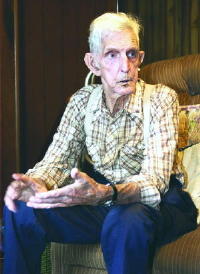 Bruce McCune
Bruce McCune
Sitting in an easy chair in the brothers' cozy living room, Bruce remembers the days when the entire farm was enclosed with a worm fence. "It was hog tight, sheep tight-almost rabbit tight, to tell you the truth," he says.
He still recalls the way his father could handle a grain cradle. "He was a big, tall man with long arms, stout as a giant," Bruce says. His voice softens and his eyes grow wide with boyhood awe that the years have not diminished. "He'd cut a swath 12 feet wide…. He was out at daylight and come in at dark. He'd eat his dinner-then put that hat on. He went right back out." And the biscuits his mother made from homegrown flour-Bruce also finds those hard to forget.
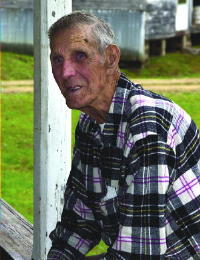 Norville "Norv" McCune
Norville "Norv" McCune
Those were the days, Norv says, when "people lived the way they're supposed to." Whether it was apple peeling, canning, cutting corn, or putting up hay, neighbors would put out the call and others would come to help. Especially in times of need, like the time Norv and Bruce's father broke his arm, friends came to do whatever needed to be done.
In turn, neighbors shared what they had with each other. The McCunes made sure everyone had fresh fruit. "Sackful after sackful they toted fruit out of here," says Bruce. "You show me where anybody'd do that this day and time."
Yet, as the years went by and as people left the hollow, it got harder and harder to find help on the farm. "Now you can't get nobody to help you," says Norv. "Nobody will work. They're paying these big salaries for not working. That's exactly what they're doing."
Without enough hands to do all the chores, Norv eventually sold the cattle and sheep. He now keeps four horses-two workhorses and two colts-and a bull. The cattle that graze on the property belong to someone else.
However, at a healthy 187 pounds with, as he says, "my socks on," Norv still hunts and tends the farm, just as he has always done, albeit on a smaller scale. He uses a horse-drawn mower to cut and rake hay, then stacks it by hand. When he is not tending the land, he may be butchering beef or skinning and cleaning a raccoon he has hunted. "I butcher my own beef and I know what I'm eating," he says.
For this task, which he performs just outside the barn, he uses a gambrel he made in his blacksmith shop. The tool is used to hang up just about any size animal for cleaning and butchering.
Indeed, Norv is proud of, and well known for, his skills in his tiny forge; in fact, he recently made eight gambrels ordered by a neighbor. He also makes hefty metal rings that serve a variety of purposes on the farm. Handy with a needle and thread, he does leather work, repairing saddles and horse collars.
He once had a sewing machine but gave that up and now does all the stitching by hand. He recently repaired five saddles for a fellow up the road in Roane County. He has also made knife and pistol holders.
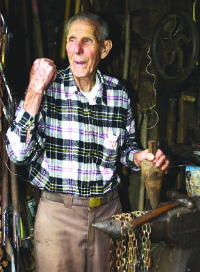 At 84, Norv is still a skillful blacksmith.
At 84, Norv is still a skillful blacksmith.
Through the years, Norv always liked to give people a good deal for the good work he did, and that is still so. "I do a lot of work for people and I don't charge them," he says. Once he did some work for the gas company, he says, and the company paid him double what he charged.
Bruce doesn't get around as well as he used to due to the flare-up of an old back injury. "If it wasn't for my back, I'd be flyin' like a kite," he says. But Bruce still keeps a garden and helps with the cooking and canning.
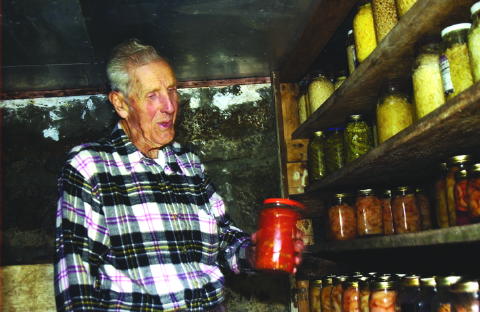
Norv inspects the stockpile of fruit and vegetables
that he and Bruce raise and can each year.
In his younger days, there were few professions Bruce didn't try. He was a top-notch electrician and also did some blacksmithing and timber work.
"I'd do just about anything that come along," he says. "I was never out of a job. Carpenter work; brick, mason work; work in the oil fields. I done quite a bit of wreckin' and liked that best of all. I'm also pretty good with figures, I'll tell you that. When people would run into trouble, they'd come to me to get straightened out. I filled out a lot of income tax back when it wasn't so complicated."
Not long ago, Bruce and a 95-year-old friend who lives in Spencer were reminiscing about the time long ago when they were together atop a building on a wrecking job. The two were reveling in their lack of a fear of heights. Said the friend to some younger boys standing on the ground, "Me and Bruce, if we had some way to get up, we'd work on the moon!" Of course, had that been possible, Bruce would have required safe passage back to the hills of Calhoun County.
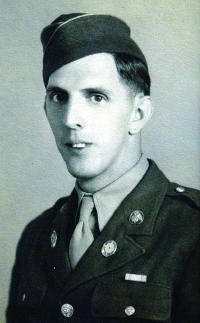 Bruce McCune's military service took him to the beautiful Hawaiian islands, but he prefered the mountains of Calhoun County to the beaches of Hawaii.
Bruce McCune's military service took him to the beautiful Hawaiian islands, but he prefered the mountains of Calhoun County to the beaches of Hawaii.
He served in the Army for "three years, six months, and 19 days," he says, and quickly adds, "It seemed like it was 20 years." Though his service took him to the Pacific islands, including Hawaii-"a beautiful place"-he is quick to add, "Not a day of it did I enjoy."
As for Norv, he saw a good deal of combat as a member of the 89th Infantry Division. He well remembers the day he left Calhoun County: April 3, 1941. He was inducted into the Army the next day and served for five years. Norv was married once, to Helen, whom he met while in training in Biloxi, Mississippi. Sadly, Helen died while Norv was serving combat duty in Europe. He doesn't talk much about his wife, only to say, "I could have been married a hundred times, but one wife is all a fella needs."
After the war, Norv worked briefly in a glass factory near Vienna, West Virginia, but he didn't like it much and soon went home to the farm. "I've been here ever since," he says. He later adds, "I wouldn't trade this old house for all the houses in the county." Both brothers are proud of the family possessions that have been passed down and that they still hold dear: their mother's clock, acquired with coupons, that still holds a place of honor on a living room wall; an oak bureau that stands in the kitchen, obtained by saving Spirit tobacco tags; their great-great-great grandmother's clay pipe; their great-grandfather's handmade tools.
And while a television occupies a prominent place in the brothers' living room, a ringing telephone never interrupts their favorite shows. Their father was against having a telephone in the house and the brothers have upheld this family rule.
In Norv's view, "People want too much and they go into debt. I'm thankful for what I've got and for my health." Norv also has advice for policymakers: "Instead of paying these young, stout guys [for not working], they should give them a job cleaning up creeks and other community work. There's a lot of things they could do."
The brothers agree that the family land in Calhoun County is the only place they'd ever want to live. Noting the abundant deer, turkey, and occasional bobcat that visit the farm,Bruce says, "It suits me here."
"I've been happy the biggest part of my life," adds Norv.
SUBSCRIBE to West Virginia's premier magazine of culture and history: